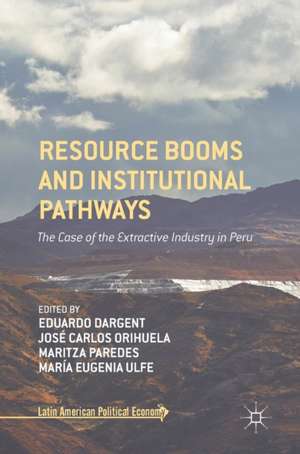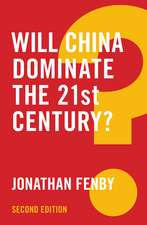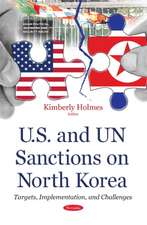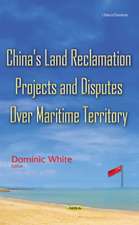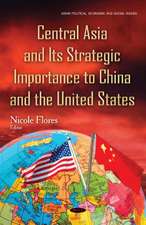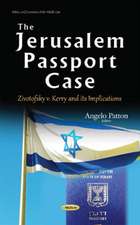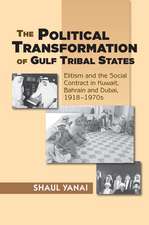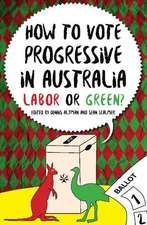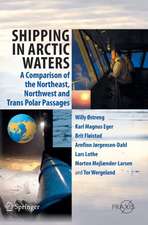Resource Booms and Institutional Pathways: The Case of the Extractive Industry in Peru: Latin American Political Economy
Editat de Eduardo Dargent, José Carlos Orihuela, Maritza Paredes, María Eugenia Ulfeen Limba Engleză Hardback – 26 iul 2017
| Toate formatele și edițiile | Preț | Express |
|---|---|---|
| Paperback (1) | 575.41 lei 39-44 zile | |
| Springer International Publishing – aug 2018 | 575.41 lei 39-44 zile | |
| Hardback (1) | 643.84 lei 6-8 săpt. | |
| Springer International Publishing – 26 iul 2017 | 643.84 lei 6-8 săpt. |
Preț: 643.84 lei
Preț vechi: 757.46 lei
-15% Nou
Puncte Express: 966
Preț estimativ în valută:
123.23€ • 128.17$ • 103.27£
123.23€ • 128.17$ • 103.27£
Carte tipărită la comandă
Livrare economică 13-27 martie
Preluare comenzi: 021 569.72.76
Specificații
ISBN-13: 9783319535319
ISBN-10: 3319535315
Pagini: 205
Ilustrații: XV, 206 p. 9 illus., 7 illus. in color.
Dimensiuni: 148 x 210 mm
Greutate: 0.51 kg
Ediția:1st ed. 2017
Editura: Springer International Publishing
Colecția Palgrave Macmillan
Seria Latin American Political Economy
Locul publicării:Cham, Switzerland
ISBN-10: 3319535315
Pagini: 205
Ilustrații: XV, 206 p. 9 illus., 7 illus. in color.
Dimensiuni: 148 x 210 mm
Greutate: 0.51 kg
Ediția:1st ed. 2017
Editura: Springer International Publishing
Colecția Palgrave Macmillan
Seria Latin American Political Economy
Locul publicării:Cham, Switzerland
Cuprins
1. Introduction.- 2. Deeply-Rooted Grievance, Varying Meaning: The Institution of the Mining Canon.- 3. Extracting to Educate? The Commodities Boom, State Construction, and State Universities.- 4. Fragmented Layering: Building a Green State for Mining in Peru.- 5. The Social Construction of a Public Problem: The Role of the Ombudsman on Building Institutions for Extractive Conflict.- 6. Ethnicity Claims and Prior Consultation in the Peruvian Andes.- 7. Conclusions.
Notă biografică
Eduardo Dargent is Associate Professor in the Department of Social Science at the Pontificia Universidad Católica, Peru.
José Carlos Orihuela is Associate Professor in the Department of Economics at the Pontificia Universidad Católica, Peru.
Maritza Paredes is Associate Professor in the Department of Social Science at the Pontificia Universidad Católica, Peru.
María Eugenia Ulfe is Associate Professor in the Department of Social Science at the Pontificia Universidad Católica, Peru.
Textul de pe ultima copertă
This book analyses institutional development that the Peruvian state has undergone in recent years within a context of rapid extractive industry expansion. It addresses the most important institutional state transformations produced directly by natural resources growth. This includes the construction of a redistributive law with the mining canon; the creation of a research canon for public universities; the development of new institutions for environmental regulation; the legitimation of state involvement in the function of prevention and management of conflicts; and the institutionalization and dissemination of practices of participation and local consultation.
Caracteristici
Provides an in-depth analysis about the effects of commodity booms over institutional development and state capacity Explores both the macro and micro dynamics of the resource boom, allowing for a proper evaluation of the ways in which legacies, new actors, and international agendas impact both institutional development and state capacity Undertakes an interdisciplinary approach Includes supplementary material: sn.pub/extras
